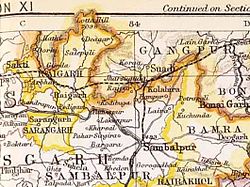Sakti State
| Sakti State सक्ती रियासत |
|||||
| Princely State of British India | |||||
|
|||||
| Sakti State in the Imperial Gazetteer of India | |||||
| History | |||||
| • | Established | TBD | |||
| • | Accession to the Union of India | 1948 | |||
| Area | |||||
| • | 1892 | 357 km2(138 sq mi) | |||
| Population | |||||
| • | 1892 | 22,819 | |||
| Density | 63.9 /km2 (165.5 /sq mi) | ||||
Sakti State was one of the princely states of India during the British Raj. It belonged to the Chhattisgarh States Agency, which later became the Eastern States Agency.
The capital was Sakti town, which had 1,791 inhabitants according to the 1901 Census of India. Today it is located in the state of Chhattisgarh. It had an area of 357 km² and, in 1982, a population of 22,819 inhabitants. Its rulers were Hindu and had a privy purse of 29,000 rupees. The princely state acceded to the Indian Union on 1 January 1948, thus ceasing to exist.
Sakti State's rulers were Raj Gonds. The year when the state was founded is not known. Legend says that it was founded by two twin brothers who were soldiers of the Raja of Sambalpur. The capital was in Sakti, Janjgir-Champa district, Chhattisgarh. Sakti's last ruler was Rana Bahadur Leeladhar Singh, born on 3 February 1892, who succeeded as new rana on the 4 July 1914. The princely family still exists and is headed by Raja Surender Bahadur Singh, who represented India in its hockey team and was twice a minister for the government of the State of Madhya Pradesh.
The rulers of this princely state bore the title of 'Rana'.
Coordinates: 22°02′N 82°58′E / 22.03°N 82.97°E
...
Wikipedia

